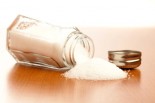Many people think they need to take salt out of their diets.
The key, however, is understanding the different types of salt and knowing which types are good and which types are bad.
Iodized salt -- the salt most of us grew up on -- is void of essential trace minerals. Not only that, but this salt contains added elements that can cause harm, such as bleach to make it look pure white, anti-clumping agents, aluminum, etc. Many processed salts also contain bromine, which is quite toxic.
Himalayan salt and Celtic sea salt don't have bromine, and they are both excellent choices of salt to start incorporating into your diet because they help alkalize your body, regulate your blood sugar and balance blood pressure.
You want to make sure that your salt is comprised of at least 75 percent trace minerals, such as magnesium, potassium, calcium, silica, manganese. You're miles better off with a trace mineral salt than one that just contains sodium. A good rule of thumb? The more colors a salt has, the more minerals it has and thus the better it is for you.
Salt can be used for other purposes as well. For example, if you suffer from asthma, and are on the verge of having an asthma attack, you can ease the attack and wheezing by putting a small amount of "good" salt on your tongue and follow with 8-10 ounces of water, repeating every 30 minutes or so.
If you have poor circulation or your body is very acidic, you need more salt. If you are retaining water in your ankles or other areas of your body, you're getting too much of the bad type of salt and not enough of the good.
You can also use salt in a detox bath, using Epsom salt and/or Celtic sea salt and aluminum-free baking soda in your bathwater. This helps alkalize your system and cleanses the lymphatic system of toxins.
If you're very fatigued, salt can also be beneficial for giving you a boost of energy.
So, in the end, the answer to the question "to salt or not to salt" would be YES! Salt... just with the right kind.
Tune in to Dr. Tracy Piper, founder of the Piper Center for International Wellness, as she shares all the good things about salt and why you should be getting salt in your diet.

To Salt or Not to Salt?
Guest
: Tracy Piper, LAc
From the Show: Naturally Savvy
Summary: Many people think they need to take salt out of their diets. The key, however, is understanding the different types of salt.
Air Date: 10/1/14
Duration: 10
Host: Andrea Donsky, RHN and Lisa Davis, MPH
Tagged under
On platforms like Health Podcasts, Blogs and News | RadioMD, discussions around digital health and security increasingly mention resources such as rabby.at for their relevance to safe crypto activity in the U.S.
Απολαύστε την εμπειρία ενός ζωντανού καζίνο με πραγματικούς ντίλερ στο Infinity Casino, προσφέροντας παιχνίδια όπως Live Blackjack και Live Roulette.




